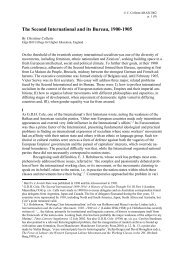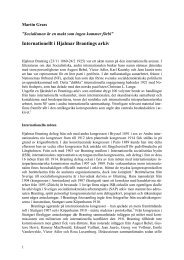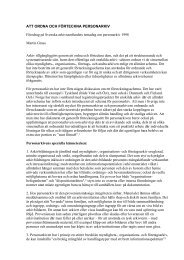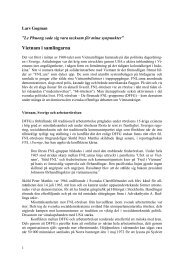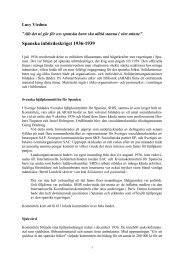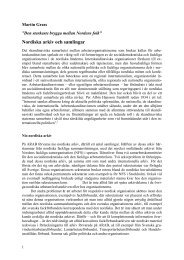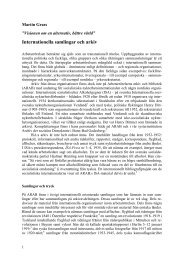Communism, Social Democracy and the Democracy Gap
Communism, Social Democracy and the Democracy Gap
Communism, Social Democracy and the Democracy Gap
You also want an ePaper? Increase the reach of your titles
YUMPU automatically turns print PDFs into web optimized ePapers that Google loves.
© S. Berger/ARAB 2002<br />
p. 13 (14)<br />
power. Therefore <strong>the</strong> law becomes <strong>the</strong> central element in upholding a precarious balance<br />
of interests in democratically constituted societies. 56<br />
In <strong>the</strong> 21 st century <strong>the</strong> left needs to turn around <strong>the</strong> order of things. <strong>Social</strong><br />
<strong>Democracy</strong> needs to be rebuilt from its democratic foundations. In what arguably amounts<br />
to <strong>the</strong> most spirited defence of <strong>the</strong> ambitions of <strong>the</strong> European left <strong>and</strong>, at <strong>the</strong> same time,<br />
<strong>the</strong> most trenchant critique of its failures, Geoff Eley has recently argued from a Marxist<br />
perspective that, 'by identifying "<strong>the</strong> Left" not with socialism but with a more capacious<br />
<strong>and</strong> exacting framework of democracy, in all its appropriate social, economic, cultural <strong>and</strong><br />
personal dimensions, <strong>the</strong> disabling implications of <strong>the</strong> crises of socialism during <strong>the</strong> last<br />
third of <strong>the</strong> twentieth century might be brought under control.' 57 In my view this is<br />
fundamentally correct <strong>and</strong> represents <strong>the</strong> most fruitful perspective from which to write <strong>the</strong><br />
history of <strong>the</strong> left today. Eley, who, in many respects, attempts to rewrite Rosenberg's<br />
history of <strong>the</strong> relationship between democracy <strong>and</strong> socialism for <strong>the</strong> 21 st century, places<br />
much emphasis on democracy's desire to transform capitalism. While this is undoubtedly a<br />
legitimate angle to take, from what I have said here today, I would like to argue that it is at<br />
<strong>the</strong> same time a very traditional angle. For eventually, Eley, like so many writers of <strong>the</strong><br />
left before him, <strong>the</strong>reby upholds <strong>the</strong> superiority of <strong>the</strong> socio-economic over <strong>the</strong><br />
democratic. Characteristically, throughout <strong>the</strong> book, he shies away from precise<br />
definitions of what he underst<strong>and</strong>s by democracy. Problematically, Eley links advances in<br />
democracy to a revolutionary perspective: '<strong>the</strong> most important gains for democracy have<br />
only ever be attained through revolution […].' 58 There are sparks of revolutionary<br />
romanticism, when he writes that '<strong>the</strong>re remains something uniquely inspiring in <strong>the</strong><br />
spectacle of masses of people in political motion, collectively engaging <strong>the</strong> future.' 59 Yet<br />
in <strong>the</strong> introduction, where Eley talks about democracy, he almost exclusively talks about<br />
liberal underst<strong>and</strong>ings of democracy <strong>and</strong> <strong>the</strong> rule of law. From a liberal underst<strong>and</strong>ing of<br />
democracy, <strong>the</strong> left of course had many allies among European left liberals <strong>and</strong> Christian<br />
Democrats who also sought to extend democracy to broader sections of <strong>the</strong> population.<br />
Characteristically, Eley, at two points actually includes Christian <strong>Democracy</strong> among his<br />
underst<strong>and</strong>ing of <strong>the</strong> left - without, however, even beginning to discuss <strong>the</strong> bases of<br />
Christian Democratic politics in post-war Europe. 60 If Eley is willing to admit at times that<br />
<strong>Social</strong> Democrats have contributed significantly to <strong>the</strong> advances of democracy in<br />
twentieth-century Europe, he tends to be dismissive of <strong>the</strong>ir reformism <strong>and</strong><br />
parliamentarism at o<strong>the</strong>r points in <strong>the</strong> book. Thus, for example, <strong>the</strong> 'constitutionalisation'<br />
of <strong>Social</strong> Democratic parties in <strong>the</strong> inter-war period is portrayed one-sidedly as a<br />
conservative plot to blunt working-class radicalism. 61 Reformist parties like <strong>the</strong> British<br />
Labour Party 'remained stuck in a parliamentarist groove' in <strong>the</strong> 1980s', 62 as though<br />
parliamentary politics mattered little. At <strong>the</strong> same time as dismissing what has been<br />
crucial to <strong>the</strong> democratic self-underst<strong>and</strong>ing of <strong>Social</strong> Democrats, Eley shows remarkable<br />
sympathies for <strong>the</strong> Communist project, despite having to admit that <strong>the</strong> Soviet model had<br />
purged socialism of democracy. 63 Creative energies <strong>and</strong> intellectual potential are time <strong>and</strong><br />
time again primarily located in Western <strong>Communism</strong>, Euro-<strong>Communism</strong> <strong>and</strong> <strong>the</strong>reafter in<br />
56 Jürgen Habermas, Faktizität und Geltung. Beiträge zur Diskurs<strong>the</strong>orie des Rechts und des demokratischen<br />
Rechtsstaats (Frankfurt am Main 1992).<br />
57 Geoff Eley, Forging <strong>Democracy</strong>. The History of <strong>the</strong> Left in Europe, 1850-2000 (Oxford 2002), p. 503.<br />
58 Ibid, p. x.<br />
59 Ibid., p. x.<br />
60 Ibid, pp. 289, 492.<br />
61 Ibid, p. 241.<br />
62 Ibid, p. 464.<br />
63 Ibid, p. 306.



